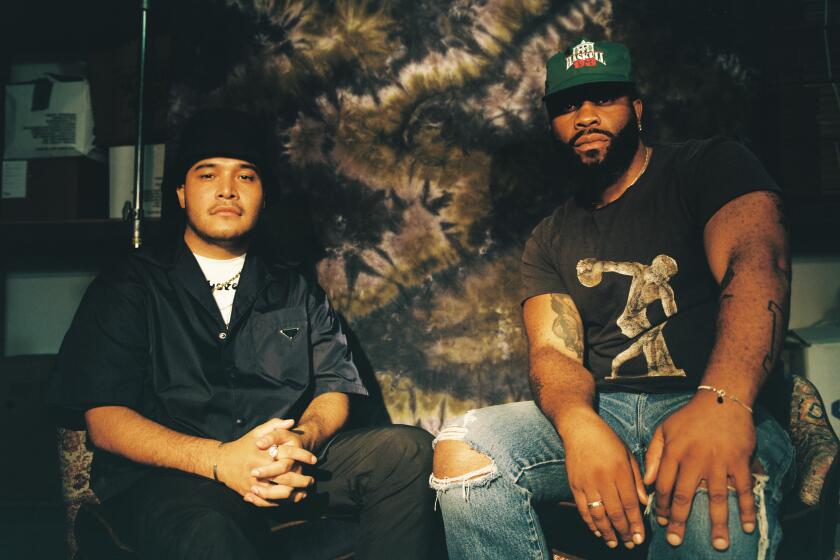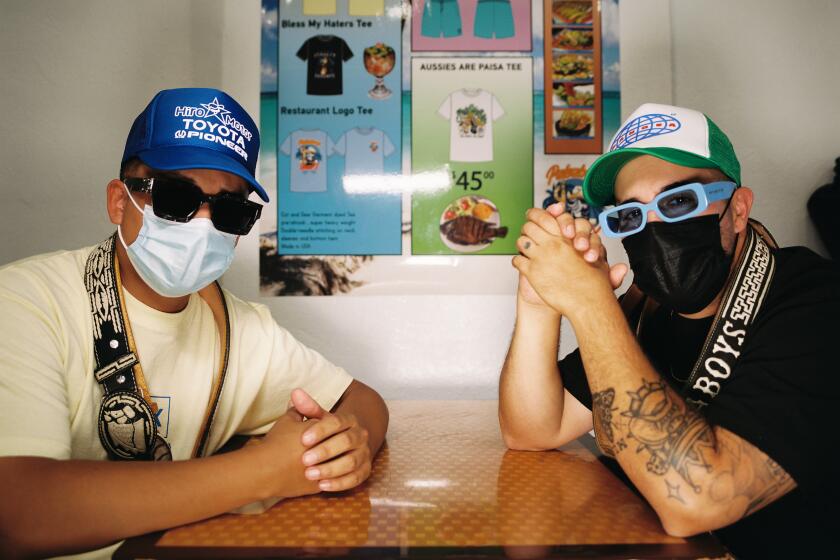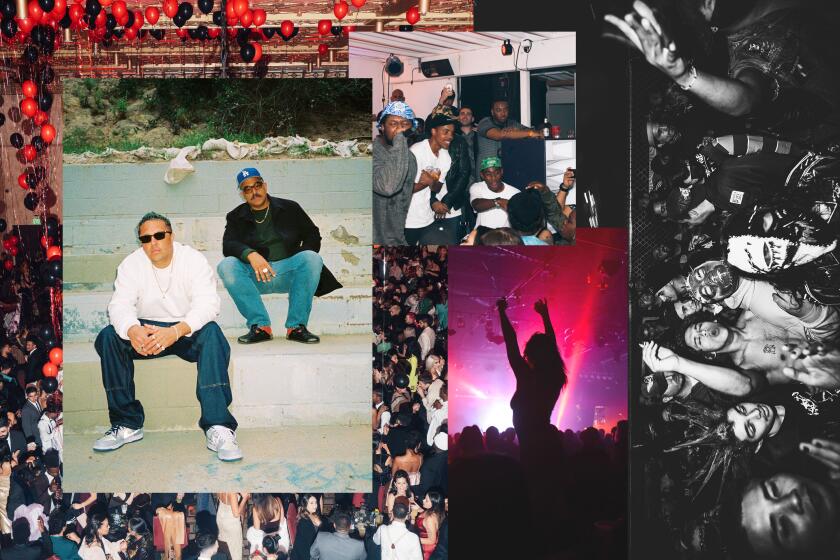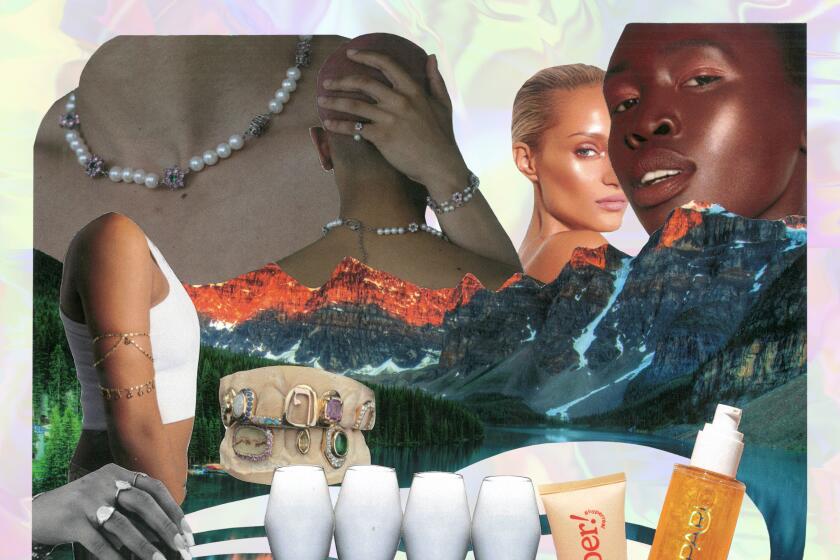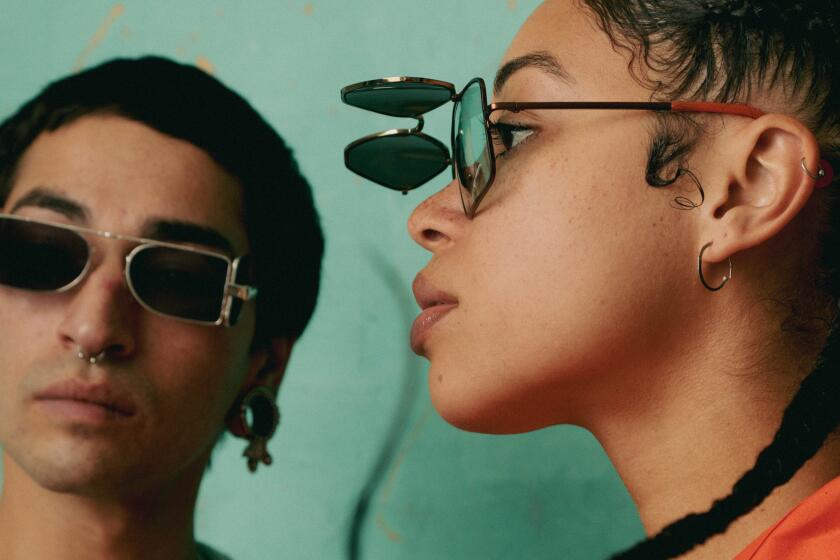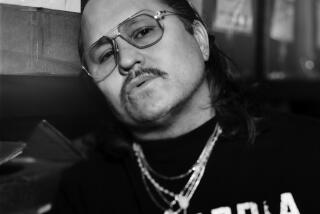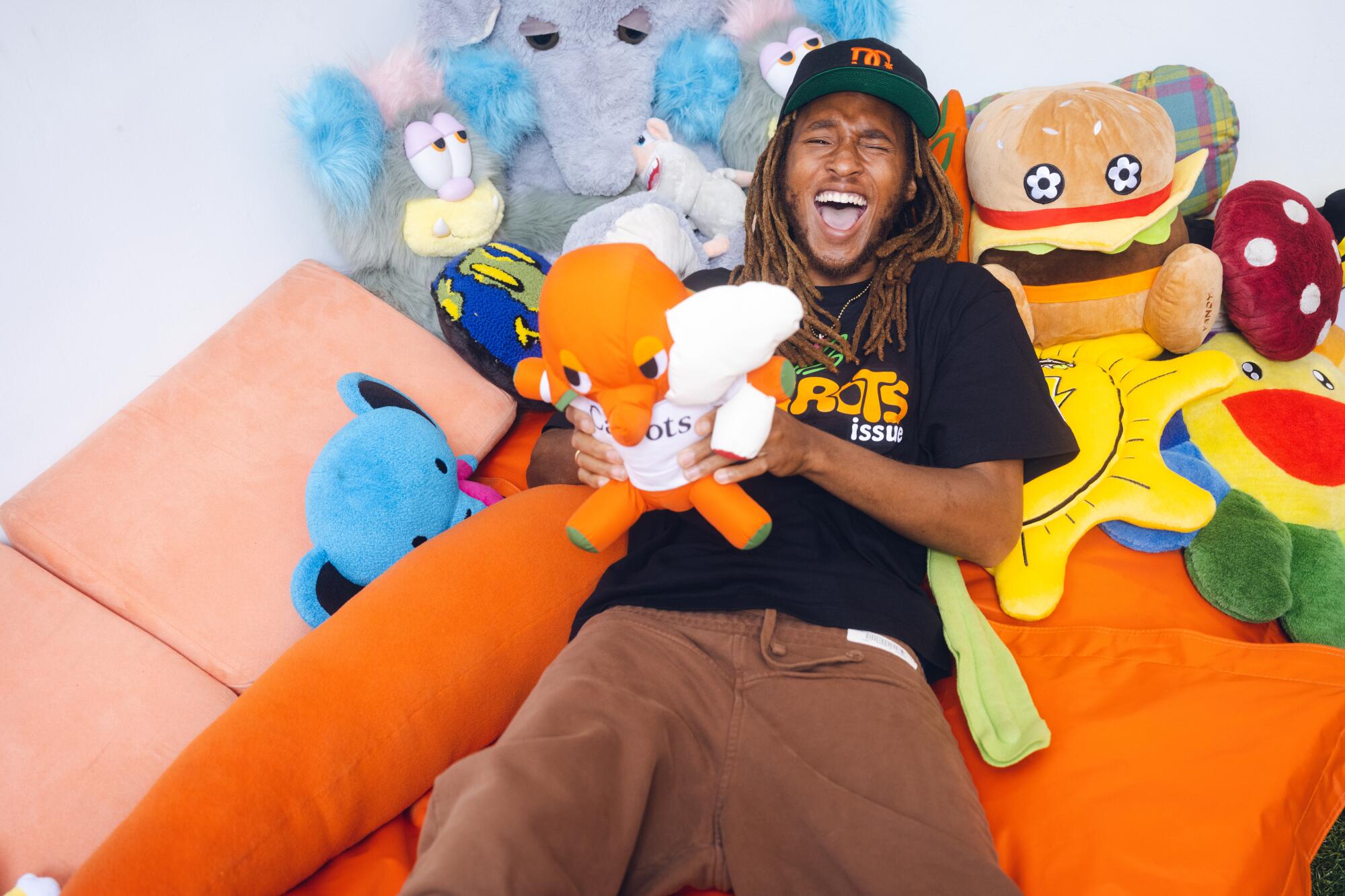
- Share via
This story is part of Image issue 10, “Clarity,” a living document of how L.A. radiates in its own way. Read the full issue here.
On an unassuming stretch of Washington Boulevard in Arlington Heights, next to the Jamaican spot everybody’s been going to for 40 years, Anwar Carrots, the creative director and founder of the eponymous menswear brand Carrots by Anwar Carrots, is in his studio. And he’s in high demand.
The Bird’s Nest Workshop, only a five-minute walk from the West Adams home Carrots spent his teenage years in, is a creative space where he hosts pop-ups, exhibitions and, last month — randomly but also not, if you know Carrots — Houston rapper Bun B. Large framed photos from lookbooks adorn the walls. Carrots’ motifs are everywhere amid the blond wood accents and tables. A bright-orange pair of Crocs sits in an elevated plexiglass case to the left, one of two styles from his first collaboration with the brand.
More stories from Clarity
L.A.’s lowrider aficionados explain why the car club plaque serves as a sacred language for the culture.
Maggi Simpkins shows what it takes to cut it as a jewelry designer in the Diamond District.
Julissa James gets to the bottom of what an L.A. night really smells like.
Dave Schilling searches for the holy grail of L.A. outerwear.
Georgina Treviño reveals that everything has a little jewelry language in it.
Upstairs, where his three young daughters usually play in a pile of exclusive streetwear stuffed animals, there are photographers vying for 20 minutes of his attention. Downstairs, people from the online marketplace StockX are setting up to capture content for an exclusive collaboration Carrots is doing with rapper Maxo Kream for Coachella. Just that morning he found out that his wife, artist Shamira Carrots, was pregnant with their fourth child. Friends and collaborators were coming in and out of the space as if it had a revolving door, dapping up Carrots, passing blunts by the front door.
Carrots, 31, seems unfazed by all of this. He’s standing near the entrance rolling a joint — his signature sun-soaked dreads hang as they always do, his gear is his, per usual (today a Carrots X DC collaboration hat and shoes). He shrugs, cracking a nonchalant smile and raising both of his eyebrows up from the center, as if to say: This is regular.
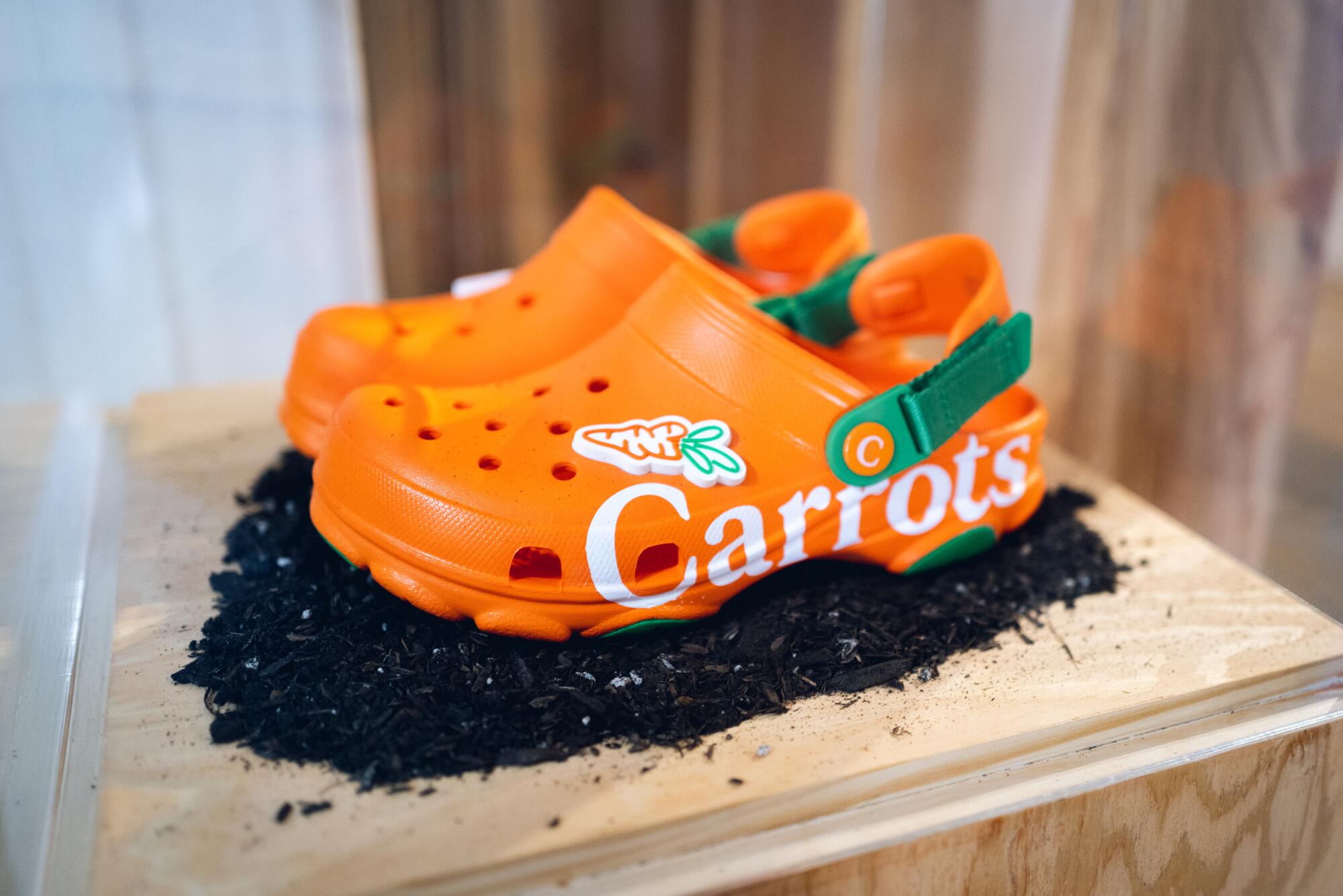
The designer has been doing some version of this since he was a teenager hanging out on Fairfax. Much longer than he’s been known as the Carrots Guy — or lately, Mr. Crocs Man. He has been around long enough to have a story about everybody in L.A. And everyone seems to have a story about him. He’s from an era when him seeing Drake walk into a store was not that big of a deal. The time when he was walking down La Brea and Frank Ocean yelled at him, “You want a ride? I know where you’re going!” out of the window of his BMW? Just a normal Friday afternoon.
Carrots isn’t one to lose himself in nostalgia. “I’m not a look back kind of guy,” he says. “But my whole thing was, let me remind you why I’m here so we can keep going forward.”
There’s something special that happens when Daniel Buezo and Weleh Dennis get in a room together. They have a bond, forged through the creation of their brand Kids of Immigrants.
In a January Twitter thread, Carrots called up a few receipts from his teens and early 20s. There were images from after he opened the Peas & Carrots International store on N. Edinburgh Avenue with then-partner Josh Peas and a cameo by Metro Boomin. An early 2010s shot of Frank Ocean that feels like a relic. Another photo features Carrots and one of his oldest friends, Tyler, the Creator — just a few baby-faced kids posted up outside the Diamond Supply store waiting for a new drop.
“Man, he’s just always been a super thorough, to-the-point person who had a real fashionable world,” Tyler told me. “A lot of people don’t have hobbies or passions of specific worlds, and he is someone who’s always done what he’s currently being known for now — since his days at Rogue Status. And we’ve been good friends since.”
Carrots’ highlight reels from his last 15 years in Los Angeles are plenty. He’s gone from being a model to a streetwear obsessive to documentarian to stalwart of the culture to an example of what happens when you make it, as the founder and creative director of Carrots by Anwar Carrots.
🥕
It’s easy to romanticize a certain era, especially when you weren’t there. But when it comes to what many today may think of as L.A. streetwear’s heyday, Carrots was there. It felt special, to be in a place that at the time was full of creative energy, kinship and also the epicenter of his passions. And a place that responded to him as soon as he got here.
July 31, 2004. Carrots arrives in Los Angeles. He had scored a modeling gig in the Virgin Islands — after stints in Trenton, N.J., where he was born, and Orlando, Fla. — and his father, convinced his son was on the brink of fame, decided to move them where else? The so-called city where dreams come true. “My pops wanted to live vicariously through me,” Carrots says. “I wasn’t really with that type of s—, but it’s family, so you go with the flow.”
Carrots’ mother was a natural hairstylist who established her practice in the back of a clothing store called Melrose Rack. And she’s an Aries. His dad is a Pisces. That combination, Carrots says, feels important in explaining his family dynamic at the time. (Carrots himself is a Cancer, a “curious Cancer.”) His parents split only six months after the big move. Carrots had just started ninth grade at L.A. High School.
Paisaboys is a brand built on innuendo. Its ethos might best be described as a hint — a highly specific yet deeply relatable nod toward The Culture.
Los Angeles wasn’t what he expected. (“It was a culture shock because it wasn’t like what movies portray,” Carrots says of L.A. “I thought, ‘Oh, this is fire.’ It’s like smoke and mirrors.”) But Carrots was adaptable. He was used to being the new kid, plus he “knew how to dress,” which in early-aughts L.A. meant brands like Sean John and LRG. He scored some T-Mobile ads and Samsung commercials but soon sensed that that life wasn’t for him. He was naturally more style-minded and had a burgeoning interest in Japanese fashion, which he discovered through the internet and blogging.
He’d been put on to stores like Teenage Millionaire, then on Melrose. But his affinity for BAPE (and anything else iconic Japanese fashion designer and DJ Nigo was doing) led him to Union, which was an official BAPE retailer. This is where Carrots got his first taste of global streetwear through an L.A. lens. “I’ve never seen astronomical prices for hoodies and sweatpants.” He asked the store’s workers countless questions, trying to get to the bottom of this world. He learned what a streetwear collaboration was. “I thought, That’s what that ‘X’ is for,” Carrots recalls.
He was looking for things to keep himself busy. So Carrots tried the streetwear game on as a hobby. He started selling fake BAPE. “My head was like, ‘How can I alleviate my mom worrying about me — in form of compensation, in the form of safety and being the man of the house? How can I make sure she’s fine?’” Carrots says. His mom’s new boyfriend (now husband), Sterfon Demings, worked as hair department head and key stylist for movies and television (credits include “Boyz n the Hood” and “Love & Basketball”). Demings introduced Carrots to Jasper Watts, who ran a brand called Rogue Status, and soon after Carrots began to work there. Streetwear became his life.
Weekends and evenings were spent in the Fairfax district. Carrots was also in deep on MySpace, gaining attention as the blogger who ran “Arrogant Veggies,” which he dedicated to all the (legit) pieces he bought with the money he earned from selling fake BAPE, working at Melrose Rack, and then Rogue Status. He was still just a teenager, but he was in the know when it came to the L.A. streetwear happenings and was documenting it closely. Plus, he just looked cool. Tyler remembers stumbling on Carrots’ page in 2005. “All the cute girls went to Fairfax High — they either went to Fairfax High or Hamilton High — and on MySpace you could run into so many people just going into profiles for girls from those schools. I would see Anwar from those pages. And then because I was getting into certain types of clothing, I would see his face around too. So I added him on MySpace,” Tyler says. “I always thought Anwar just looked so f—ing ill.”
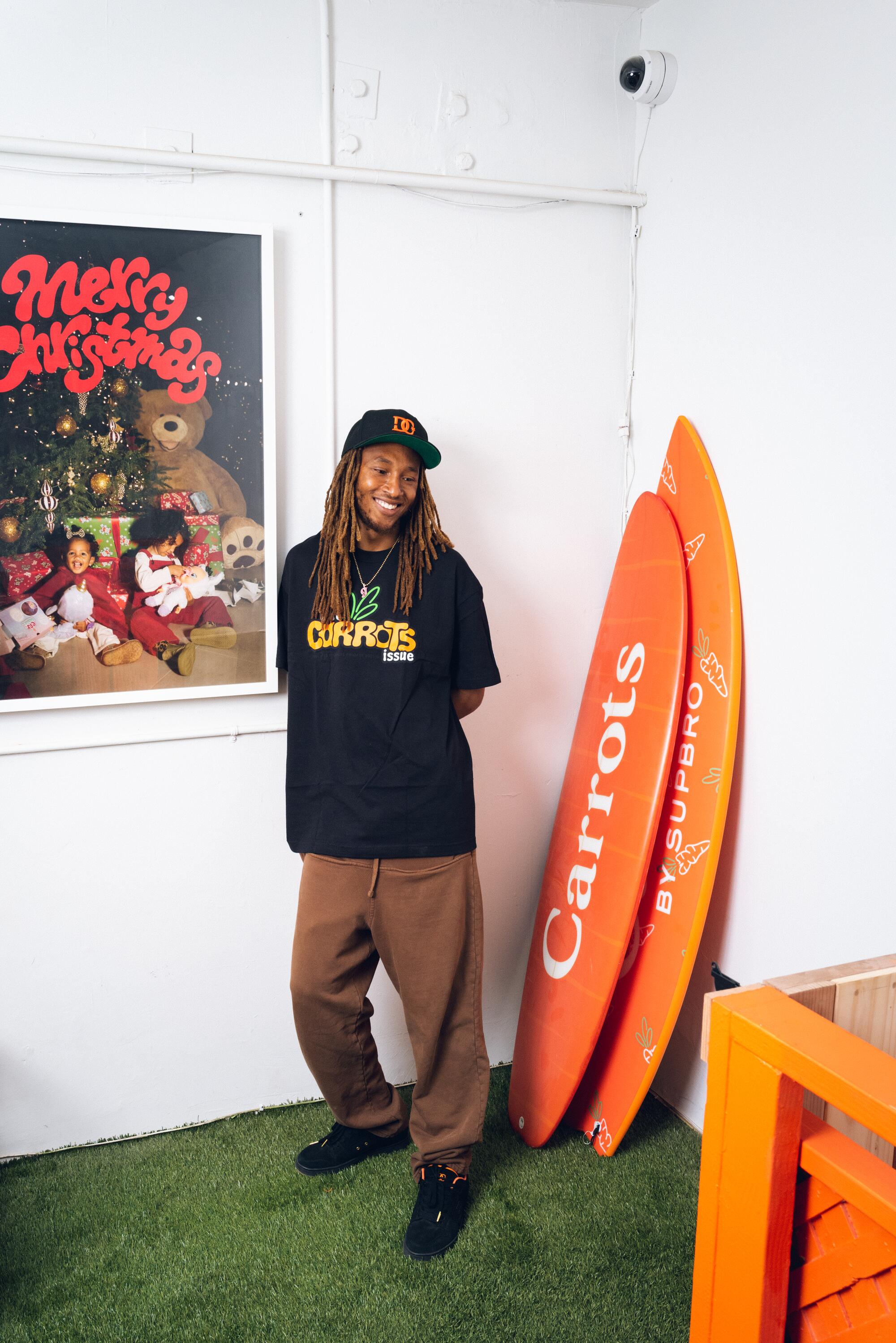
Carrots was aware of Tyler as the dude with “fire beats,” but the two wouldn’t meet in real life until 2006. Tyler remembers that day well. The energy was “super bright and saturated on La Brea”:
“The last time I saw my father, I was 15 and he took me to Stussy on La Brea to buy me a few shirts. That was the day the ‘In My Mind: Prequel’ mixtape by Pharrell [and DJ Drama] came out. It was summertime. I walk into Stussy, I have my headphones on, I’m listening to this new mixtape, my pops is walking me in and someone holds the door for me. I was like, ‘Oh f—. S—. Anwar! What the f—? It’s crazy to see you. I only see you on MySpace and Blogspot and stuff like that. What the f—?’
“Ever since that moment we’ve been friends,” he adds. “That day was very special. From the last time I saw my pops, and then me and Anwar had a friendship ever since then and the really important music that came out that summer — it was a trifecta of super important moments that would shape who I was to this day. I’ll always remember that day.”
So many important things were happening simultaneously for Carrots. And they kept happening. He started Peas & Carrots International in 2007 and opened a store in April 2013. When Tyler, the Creator, released his first single, “Yonkers,” he shouted out Carrots: “Wearing synthetic wigs made of Anwar’s dreadlocks,” he rapped. Golf Wang would be the first outside retailer to carry Peas & Carrots.
🥕
Carrots had met Peas as a freshman in high school. And while they had pseudo-beef before actually meeting (Anwar remembers it being over a girl), when they finally connected it felt kindred immediately. “We just had a real connection,” Peas says. “Even now to this day, we can look at something and then look at each other and just know what we’re thinking.” A few years after that, the two met Casey Veggies, then a 13-year-old, who was a fan of Carrots’ blog. When Peas and Carrots learned Veggies could rap, they decided to start a brand and creative collective. Carrots would give all of them their names — Carrots, Peas, Veggies — not because of an obsession with produce but an awareness of how people remembered things. He wanted names that were simple, could be associated with each other and sparked pleasant imagery and thoughts. (This continues to underscore how Carrots approaches his brand today.)
The goal was to be the West Coast version of G-Unit, and for a while, it was working. Peas was handling the music side, managing Veggies, while Carrots was handling the fashion and merchandise and Veggies was focused on making the music. When they all went on tour, after Veggies was invited to open for Mac Miller in 2011, Carrots created a custom line of Peas & Carrots merchandise that sold out. It was how you’d imagine working with your closest friends would be, if you were lucky: not like work at all. By the time they were barely 20 years old, Peas & Carrots International had already created a cult following and carved out their own little piece of the Fairfax District.
I always thought Anwar just looked so f—ing ill.
— Tyler, the Creator
In 2014, tensions started to bubble and egos began to clash. Chalk it up to creative differences, except the fact that it hurt more because these were Carrots’ close friends. Carrots says he was the first one to call it quits. He didn’t want to fight with his boys; he wanted to make clothing and creative direct. Peas moved on, becoming the marketing manager at Amazon Music, and Veggies, who was unreachable for comment at the time of publication, continued his rap career. “That time leading up to us ending is probably the worst time of my life,” says Peas. “We had built something that was so powerful, that people wanted in on it. We were literally living the rap story: You get a certain amount of success, and it tears apart because of ego and greed.”
Carrots by Anwar Carrots launched the same day Carrots called Peas to tell him he was out in 2015. As Carrots describes it, it was a continuation of this work he had been doing for years. And it was time. The logo felt obvious. Who doesn’t know what a carrot is? “There was so much letting go that all I cared about was: Whatever I can get this carrot on, let’s rock.”
What really goes down at Born X Raised’s epic ragers.
His designs, simple and centering around a carrot or dirt or bunnies or something you’d find on a farm, in straight-to-the-point colorways like orange, green, brown or black, have created their own visual language — one that a variety of people can relate to, and a variety of companies can see themselves working with. The logo is also a reflection of the kind of creative director and person Carrots is: casual, down to earth, go with the flow. “I don’t have a design philosophy,” he says. “I don’t have a mood board. I pull references based on what I wanted in the past.”
In the years since he launched Carrots by Anwar Carrots, Carrots has become kind of collaborator in chief in L.A. and beyond. He’s amassed mentions everywhere, from Hypebeast to Complex to GQ. In 2017, the New York Times featured Carrots in its “Up Next” series, dubbing him “the Martha Stewart of streetwear,” a distinction he’s only grown into more since the write-up. The Carrots logo has become a shorthand for the spirit of the collab in its own right, and not just in traditional streetwear or fashion. Carrots has countless collaborations, from K-Swiss to the Hundreds to Champion. The carrot also appears in a collection with Grillo’s Pickles. A few years ago, it was phone case company CASETiFY. Just last month, it was Urban Water.
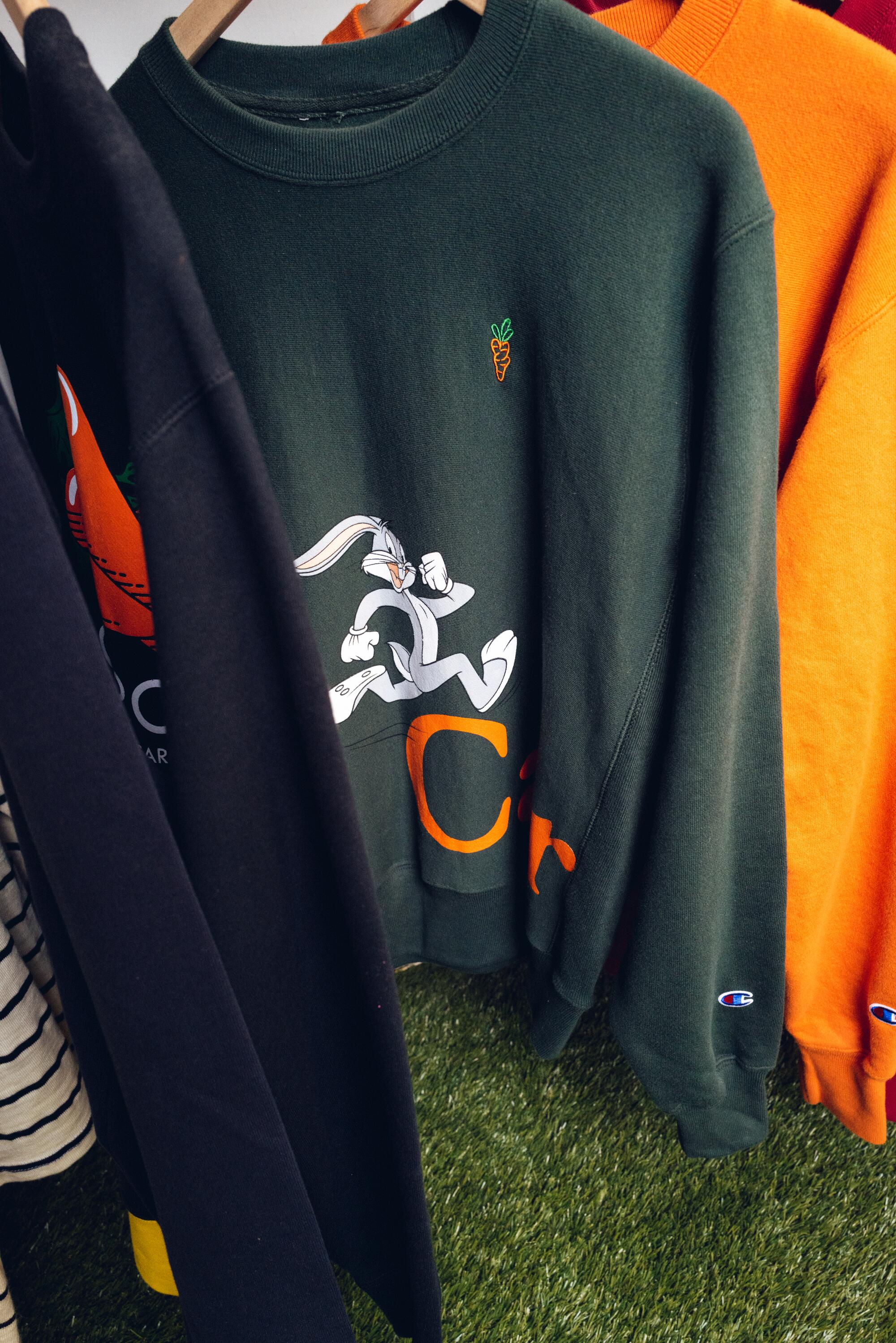
“I’ve got a list of collaborations for this first quarter: 25,” Carrots says. (He’s only ever said no to a collab once because the brand didn’t necessarily align with his lifestyle.) “The whole reason of being in this space is to make products, so why does it matter who you make product with? As long as you make product. My job is to make stuff look cool.”
🥕
Perhaps it’s impossible to compartmentalize your brand when it literally bears your family name. Carrots runs his company as an extension of himself. There are no work-life boundaries — it’s all one thing. He brings his kids — 4-year-old Naaz, 2-year-old Zari and 1-year-old Jia — wherever he goes. They’re in on meetings, interviews, brainstorms. During one of our conversations, Carrots dropped what he was doing numerous times to answer their questions, take them to the bathroom and get them whatever they needed.
“You see people become fathers and you see them give up hobbies and passions and you think that’s how it goes,” says Tyler, the Creator. “But every time I see him, he’s just got them with him and he’s doing him. It’s really awesome. That trope, that stereotype that I’ve kind of made up in my head from other things I’ve seen, does not exist with him.”
While Carrots refuses to be stuck in the past, he has found a way to be informed by it — almost as a measuring stick of how far he’s come.
Josh Peas relates to this. “At the time, we didn’t even think of what it would be,” he says. “We were just like, ‘Yo. This is a cool little block. There are stores over here that we f— with. There’s s— kind of happening.’ You’d catch the occasional rapper coming in to buy clothes. But I’ve been reflective of that time a lot lately. We’re finally doing the things that we watched coming up. So many people we grew up with fell off and lost their way, and we were able to accomplish our dreams.”

Anwar Carrots has gotten there, not just through will and improvisation but by allowing connections to steer his course. Collabs in the Collab City don’t last without maintaining a good reputation. Some words that have been used to describe Carrots are: “not a hater,” “real,” “pure” and “unapologetic.” He’s been this way since he stepped foot in L.A., back in 2004, and his early years in streetwear only solidified these qualities.
Carrots takes that energy with him, even subconsciously. When I ask how he has the drive to continue doing what he does, he answers: “I’m floating. Like I said, I’m still a 17-year-old.”
More stories from Image
